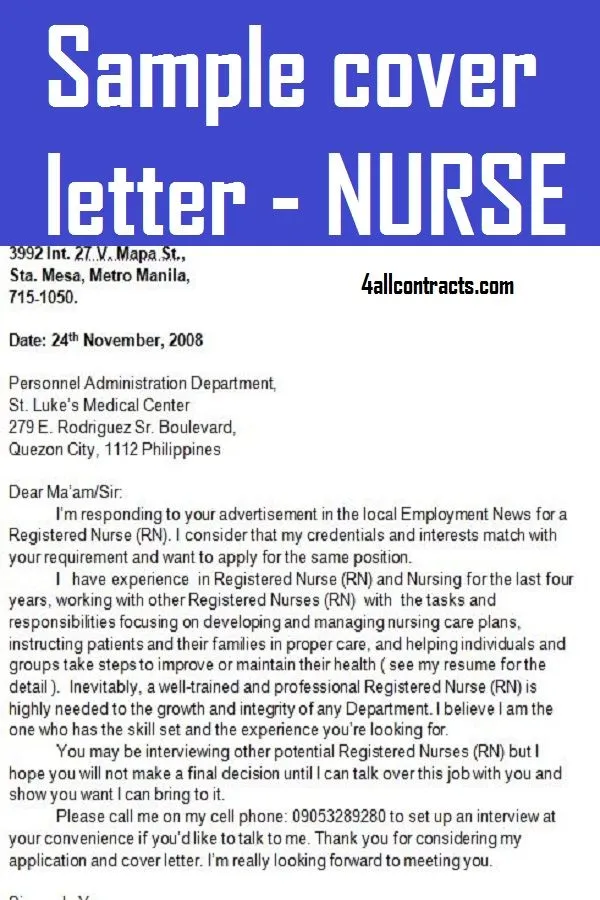The Importance of a Nurse Cover Letter
In the competitive field of nursing, a well-crafted cover letter can be the key to unlocking your dream job. It’s your first chance to make a strong impression on a potential employer, setting you apart from other applicants. A cover letter is more than just a formality; it’s your opportunity to personalize your application and demonstrate why you’re the ideal candidate for the position. It provides a platform to showcase your skills, experiences, and passion for nursing, going beyond the basic information listed in your resume. By taking the time to write a compelling cover letter, you signal your genuine interest and commitment to the role, increasing your chances of getting an interview.
Why a Cover Letter Matters
A cover letter allows you to provide context to your resume. While your resume lists your qualifications, your cover letter explains how those qualifications align with the specific requirements of the job. It’s your chance to tell a story about your career, highlighting relevant experiences and skills. Additionally, a cover letter demonstrates your communication skills. Clear, concise, and professional writing is essential in nursing, and your cover letter showcases your ability to articulate your thoughts effectively. Furthermore, a well-written cover letter indicates your attention to detail, a crucial trait for nurses who must be meticulous in their work. Finally, a cover letter allows you to express your enthusiasm for the position and the organization. By showing your genuine interest, you create a memorable impression.
Highlighting Key Skills
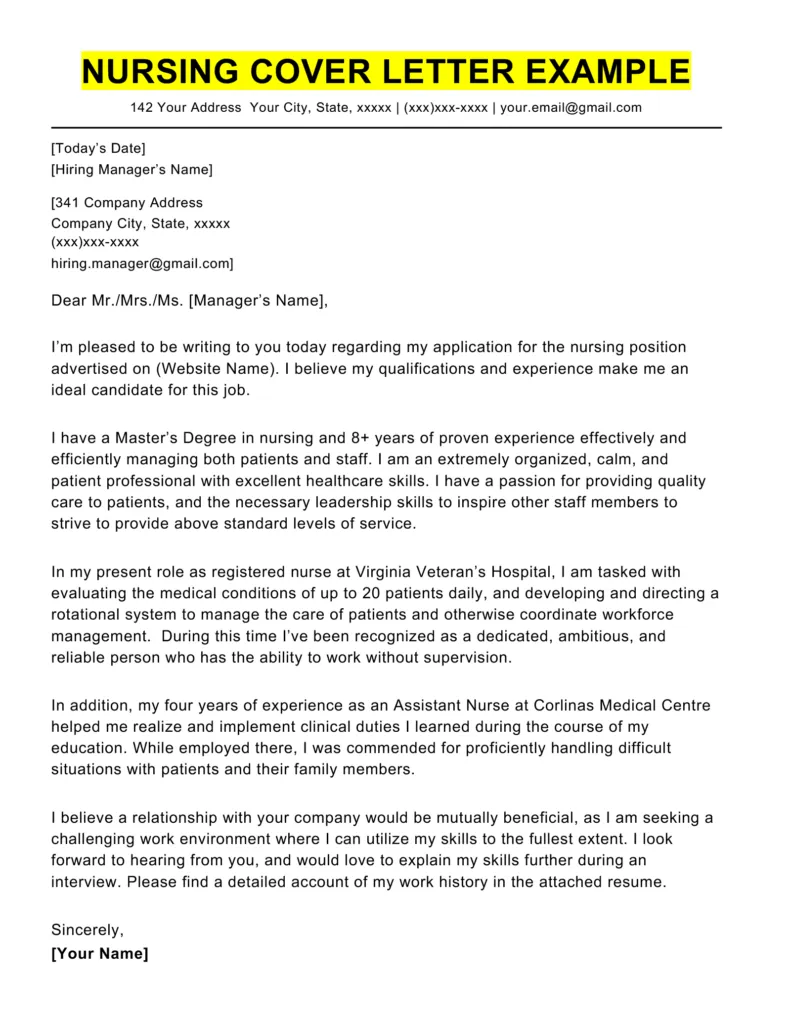
Your cover letter is the perfect place to emphasize your core nursing skills. Consider the specific requirements of the job and tailor your letter to showcase your relevant abilities. This might include clinical skills such as patient assessment, medication administration, and wound care. It could also encompass soft skills, like communication, empathy, and teamwork. Be sure to provide concrete examples of how you’ve applied these skills in previous roles. For instance, describe a situation where you effectively communicated with a patient to ease their anxiety or a time when you collaborated with a healthcare team to improve patient outcomes. By highlighting these skills and providing specific examples, you demonstrate your value as a nurse.
Structuring Your Nurse Cover Letter
A well-structured cover letter is easy to read and conveys your key qualifications effectively. The standard format generally includes a header with your contact information, a professional salutation, body paragraphs that showcase your skills and experience, and a concluding paragraph that expresses your interest. Adhering to this structure helps you present a clear and concise overview of your qualifications, making it easier for the hiring manager to understand your suitability for the position. A clear structure also demonstrates your professionalism and organizational skills, which are highly valued in the nursing profession. Following a proven structure ensures you don’t miss any important information and present yourself in the best possible light.
Header and Contact Information
Your header should include your full name, address, phone number, and professional email address. This information should be prominently displayed at the top of the letter. Ensure your email address is professional and easy to read. It’s also important to include the date and the hiring manager’s name and title if available. If you don’t know the hiring manager’s name, you can use a general salutation like ‘Dear Hiring Manager’ but always try to find the specific person’s name. The header provides the necessary contact information so the employer can easily reach out to you. Accuracy and professionalism in your header reflect your attention to detail.
Professional Salutation
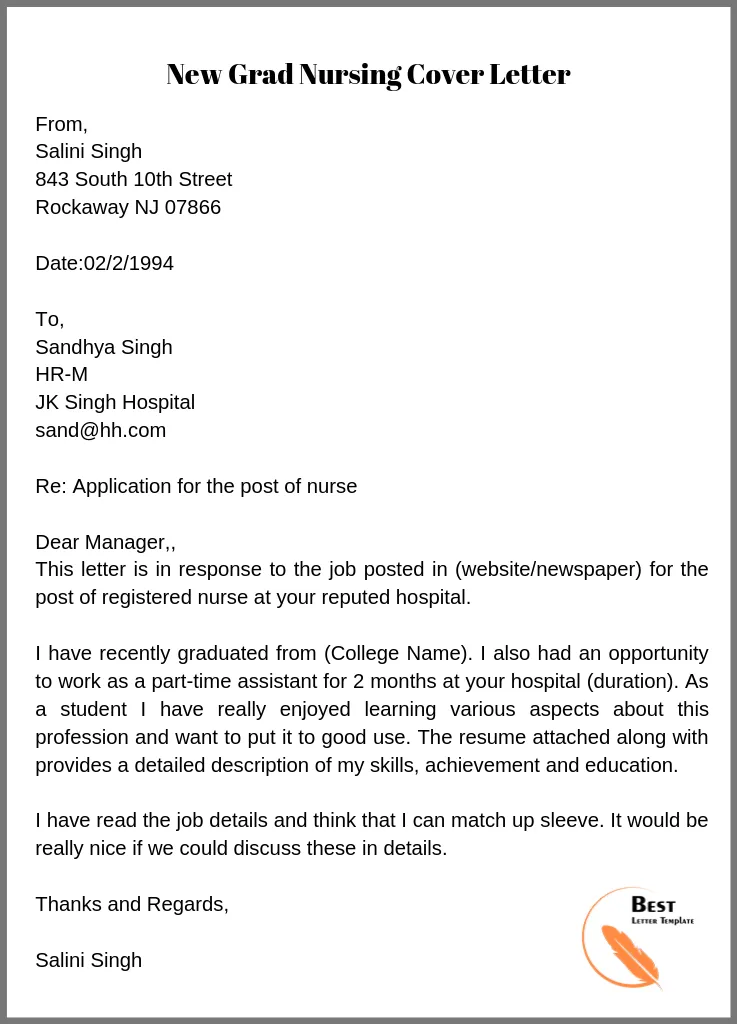
Begin your cover letter with a professional salutation. If you know the hiring manager’s name, use it; for instance, ‘Dear Ms. Smith’. If you don’t know the name, use a general salutation like ‘Dear Hiring Manager’ or ‘Dear [Department Name] Hiring Team’. Avoid generic salutations such as ‘To Whom It May Concern’. The salutation sets the tone for the letter, and using the hiring manager’s name shows that you have taken the time to research the company and are attentive to detail. Always ensure you spell the name correctly and double-check the title. A professional salutation shows that you value the hiring manager’s time and are committed to the role.
Body Paragraphs
The body of your cover letter is where you present your skills and experience. This section should be divided into several paragraphs to create a clear flow of information. The goal is to demonstrate how your qualifications align with the job requirements and to show your enthusiasm for the role. Each paragraph should have a specific focus, such as expressing your interest, highlighting your skills and experience, or explaining why you are a good fit for the organization. The body paragraphs are where you tell your story, allowing you to showcase your personality and passion for nursing. A well-organized and detailed body section can significantly increase your chances of making a strong impression.
First Paragraph: Expressing Interest
Start your cover letter by stating the position you’re applying for and where you saw the job posting. Express your genuine interest in the role and the organization. Briefly mention why you’re excited about the opportunity and what draws you to the company’s mission or values. This paragraph should be concise and enthusiastic, setting the tone for the rest of your letter. Show the hiring manager that you are not just applying for any job but that you are specifically interested in this particular role. Make your interest clear, show that you’ve done your research on the facility, and have a strong desire to contribute to the team. This sets the stage for the rest of your cover letter.
Second Paragraph: Showcasing Skills and Experience
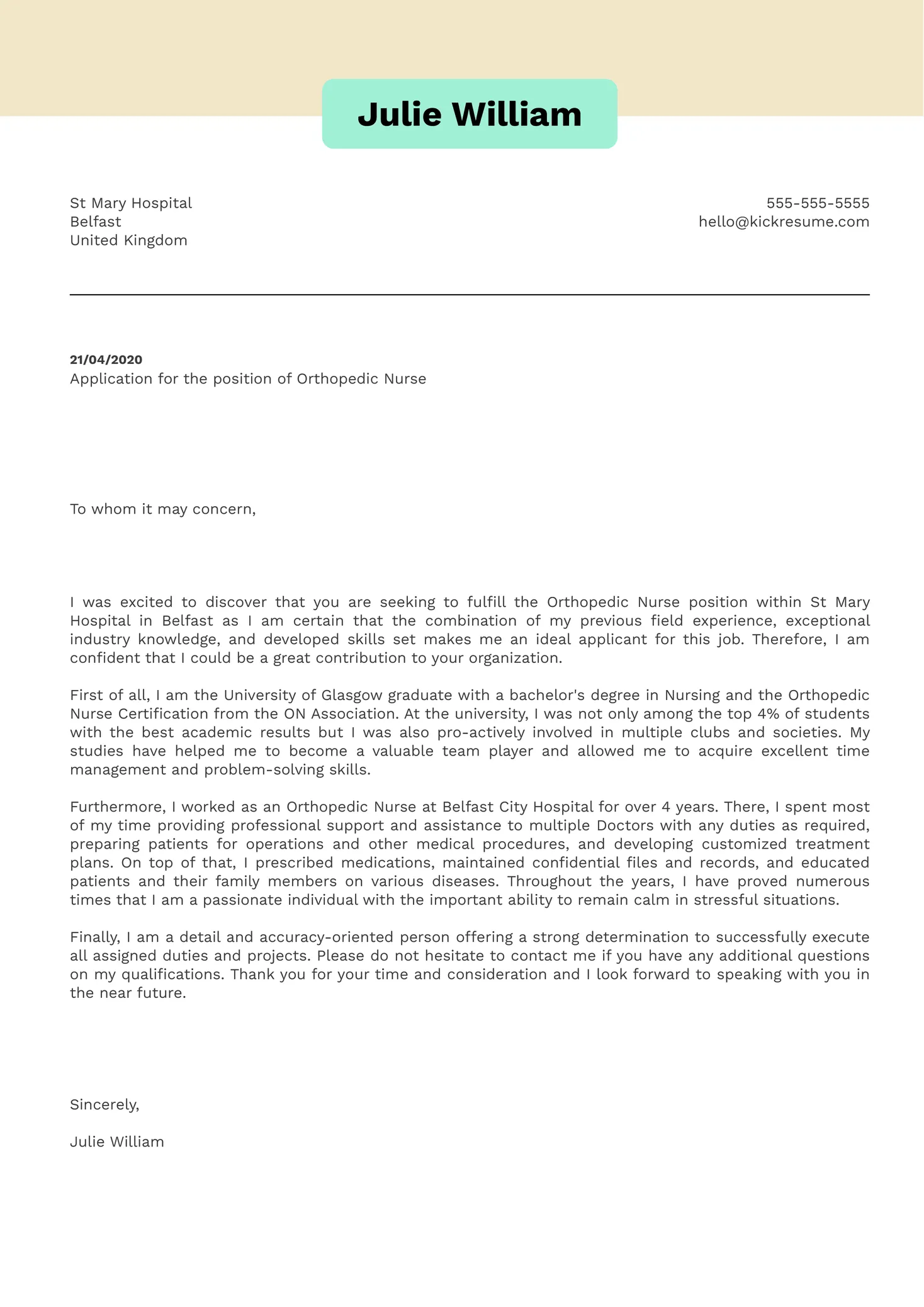
In this section, highlight your key skills and experience. Tailor your skills to match the job description. For example, if the job requires experience in a specific area of nursing, emphasize your relevant experience. Provide specific examples of your accomplishments, using the STAR method (Situation, Task, Action, Result) to describe how you have handled situations in the past. This is your opportunity to provide concrete examples of your skills. Quantify your accomplishments whenever possible. For instance, mention the number of patients you cared for, or any positive outcomes you achieved. Your goal is to demonstrate your value as a nurse and show how you can contribute to the organization’s success. By using concrete examples, you provide proof of your competence.
Third Paragraph: Demonstrating Passion and Fit
In the third paragraph, elaborate on why you’re a good fit for the organization. Explain your passion for nursing and your commitment to providing excellent patient care. Demonstrate that you understand the organization’s mission, values, or culture. Mention any specific projects, initiatives, or experiences that align with the organization’s goals. Show how your values align with those of the organization. This is your opportunity to connect with the hiring manager on a personal level and show that you share their vision for patient care. Your goal is to show your personality and enthusiasm to create a lasting impression and make you a top candidate.
Concluding Your Letter
End your cover letter with a strong conclusion. Thank the hiring manager for their time and consideration. Reiterate your interest in the position, and state that you are eager to learn more about the opportunity. Include a call to action by expressing your availability for an interview. Provide your contact information again. Proofread the entire letter for any errors. A strong conclusion reinforces your enthusiasm and makes it easy for the hiring manager to take the next steps. End with a professional closing, such as ‘Sincerely’ or ‘Best regards’, followed by your full name.
Formatting and Proofreading
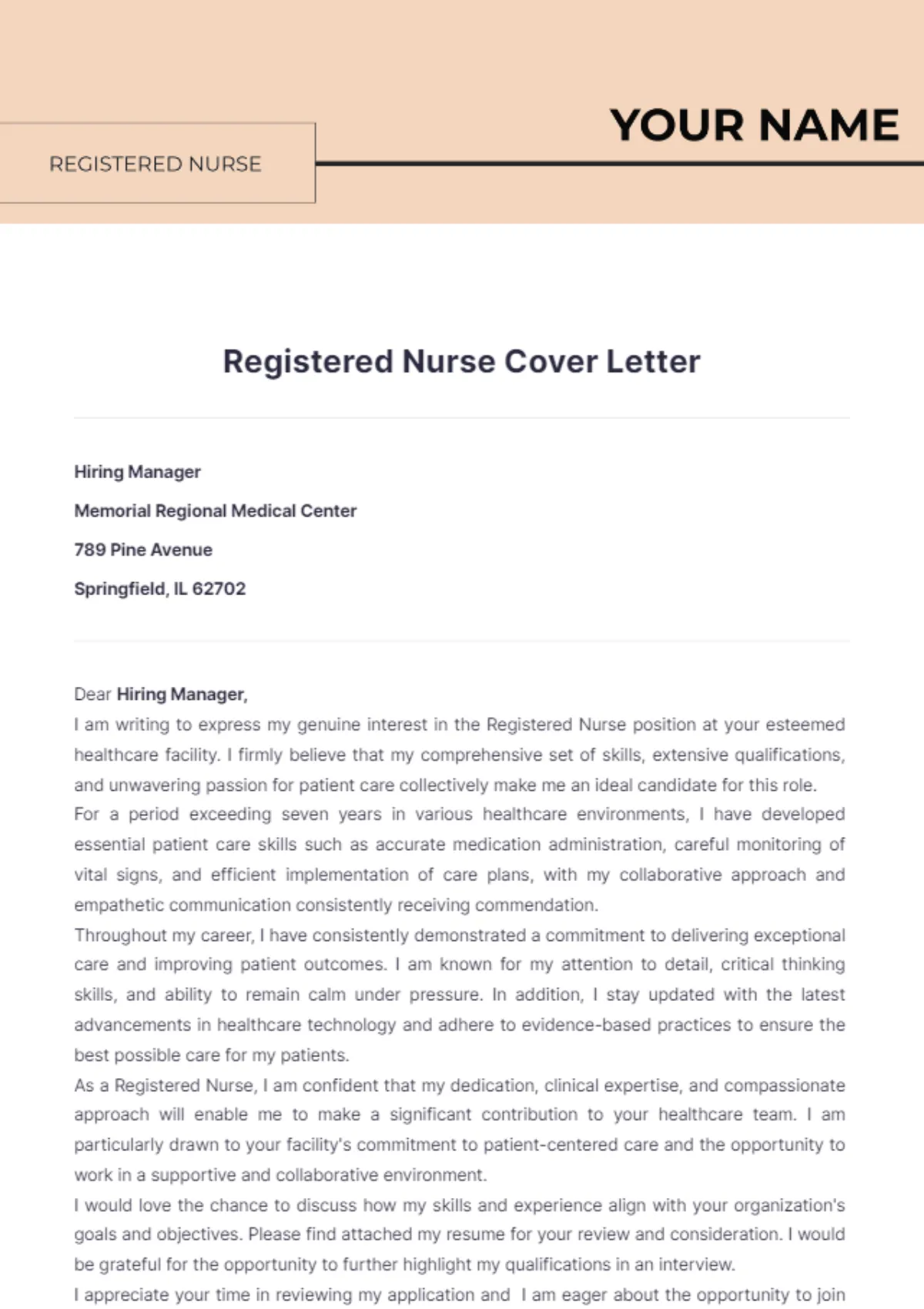
Formatting and proofreading are critical steps in the cover letter process. A well-formatted and error-free letter demonstrates your professionalism, attention to detail, and respect for the reader. Poor formatting or typos can detract from your message and make it difficult for the hiring manager to take your application seriously. Before submitting your cover letter, always take the time to proofread it carefully. Proper formatting and proofreading can significantly improve your chances of getting an interview.
Font and Formatting Guidelines
Use a clean and easy-to-read font, such as Times New Roman, Arial, or Calibri, in a font size between 10 and 12 points. Choose a font that is widely available and professional. Keep the formatting consistent throughout the document, including the use of bolding and italics. Use standard margins (1 inch on all sides) and single-space the body of the letter, with a double space between paragraphs. Ensure that the letter is well-aligned and easy to scan. The goal is to create a visually appealing document that is simple to read. Consistency is crucial for demonstrating professionalism.
Proofreading Checklist
Proofread your cover letter meticulously before submitting it. Check for spelling and grammatical errors. Verify that your contact information is correct. Ensure you’ve used the correct name and title for the hiring manager. Review the letter for clarity and conciseness. Make sure the content aligns with the job description and that you’ve addressed all the key requirements. Consider having someone else proofread your letter to catch any errors you might have missed. It is also useful to read your letter aloud to catch any awkward phrasing or run-on sentences. The goal is to present a flawless document. A final proofread is vital to ensuring you make a positive impression.
Keywords to Include in Your Cover Letter
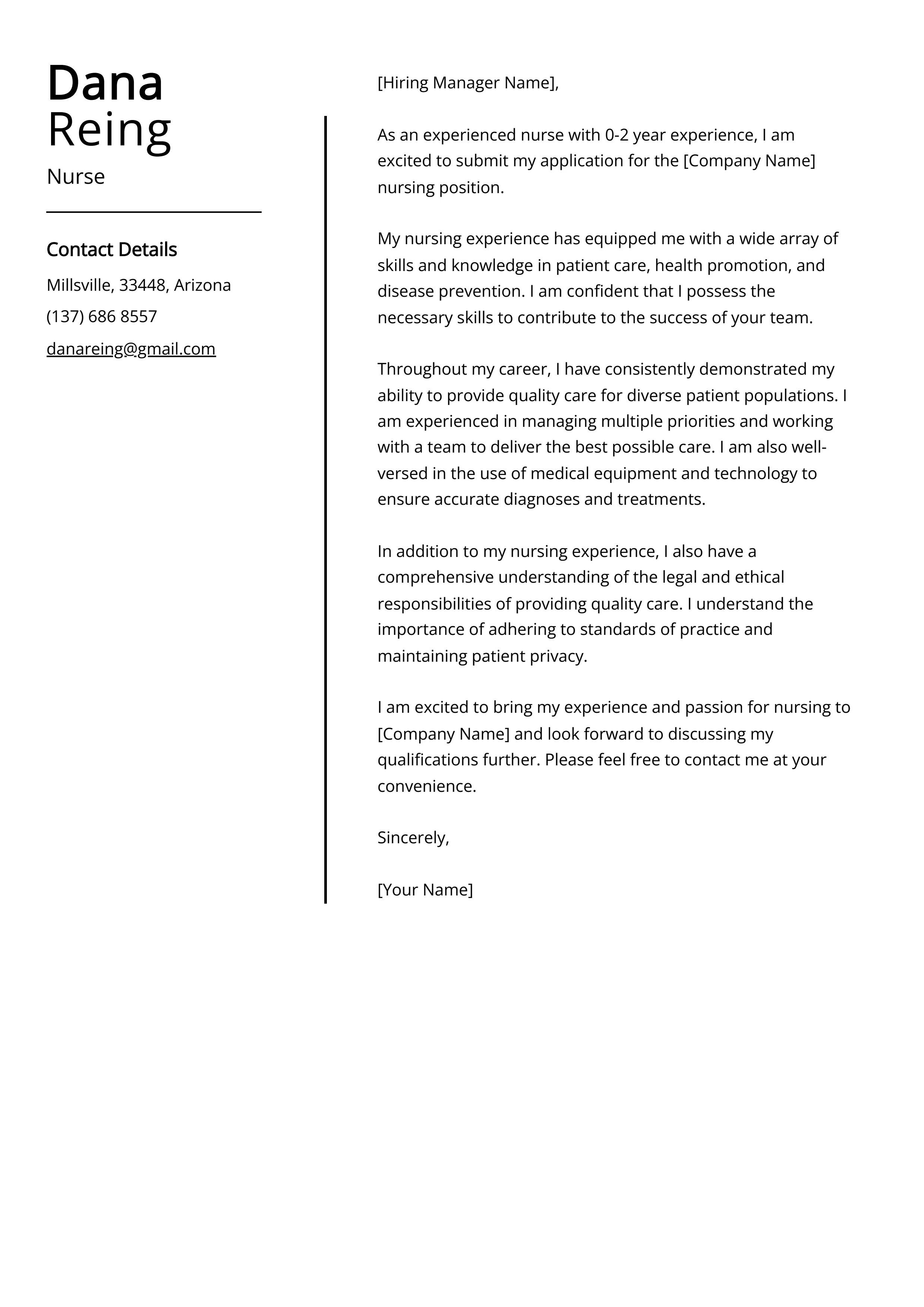
Using relevant keywords in your cover letter can increase your chances of getting noticed. Employers often use applicant tracking systems (ATS) to scan resumes and cover letters for specific terms. If your letter contains these keywords, it is more likely to be selected for review. Research the job description and identify keywords related to the required skills, experience, and qualifications. Also, research the company’s mission and values to include relevant terms. Incorporate these keywords naturally throughout your letter, without resorting to keyword stuffing. Keywords help to highlight your fit for the role and ensure your application is noticed.
Essential Nursing Skills
Highlight the essential nursing skills in your cover letter. These include technical skills, such as patient assessment, medication administration, and wound care. Also, include soft skills, such as communication, empathy, critical thinking, and teamwork. Use strong action verbs when describing your skills. Provide concrete examples of how you’ve applied these skills in previous roles. Mention any certifications or specializations, such as BLS, ACLS, or specific areas of expertise, such as critical care or pediatrics. Tailor your skill set to match the job requirements, demonstrating your ability to provide excellent patient care.
Keywords from the Job Description
Carefully review the job description to identify the keywords that are most important to the employer. This could include specific skills, experience, or technologies. Incorporate these keywords naturally into your cover letter. For instance, if the job description mentions a specific type of patient care or software, include these terms in your description. By using the language of the job description, you signal your understanding of the role’s requirements. However, avoid simply copying and pasting the job description’s keywords. Instead, integrate them seamlessly into your description to create a cohesive and compelling narrative. This helps demonstrate that you possess the necessary skills and qualifications to excel in the role.
Cover Letter Examples for Nurses
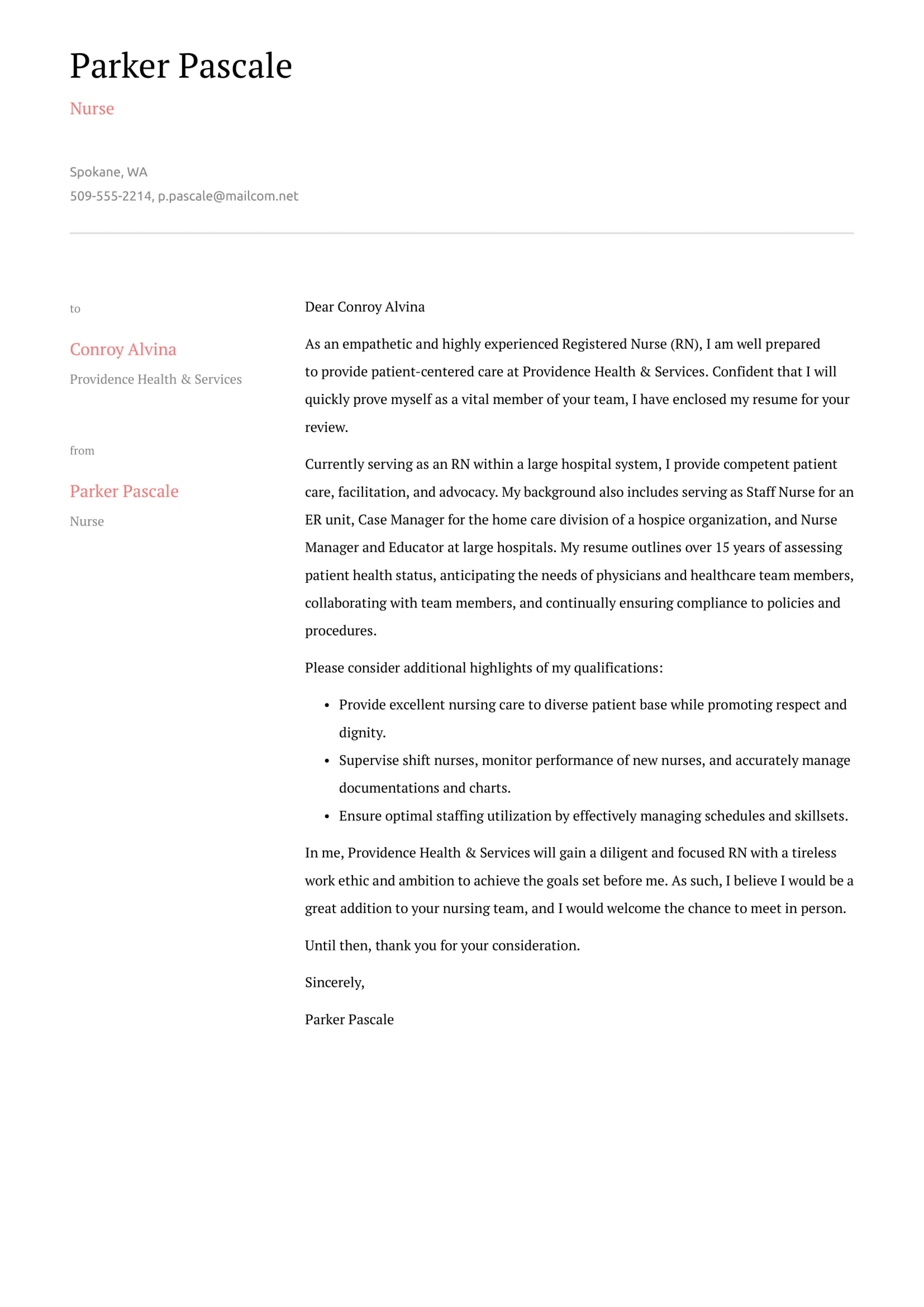
Reviewing cover letter examples can provide valuable guidance when writing your own. These examples can help you understand how to structure your letter, highlight your skills, and tailor your message to different types of nursing roles. By studying different templates, you can get ideas for your own letter, but make sure you personalize your letter to accurately reflect your skills and experience. There are examples available for different nursing roles, such as Registered Nurses (RNs) and Licensed Practical Nurses (LPNs). Tailoring your letter for the position is crucial to demonstrate your qualifications and interest in the job.
Registered Nurse Cover Letter Example
For a Registered Nurse (RN) cover letter, emphasize your clinical skills and experience. Highlight any certifications or specializations, such as critical care, emergency room, or medical-surgical nursing. Describe your ability to provide patient care, administer medications, and collaborate with healthcare teams. Mention any leadership experience, such as charge nurse responsibilities or mentoring new nurses. Tailor your letter to the specific requirements of the job, and show your commitment to providing excellent patient care and contributing to the organization’s mission. Provide measurable results, such as improved patient outcomes or reduced readmission rates, to demonstrate your value as an RN.
Licensed Practical Nurse Cover Letter Example
When writing a cover letter for a Licensed Practical Nurse (LPN) position, emphasize your patient care skills, ability to assist with procedures, and collaborate with RNs and physicians. Highlight your experience in taking patient vital signs, administering medications, and providing basic care. Mention any specialized training, such as wound care or IV therapy. Focus on your ability to work effectively as part of a healthcare team. Demonstrate your commitment to patient safety and comfort, showcasing your compassion and attention to detail. Describe your ability to follow protocols, and contribute to a positive environment for patients and staff. Provide examples of how you provide excellent care to all patients.
Tips for Different Nursing Specialties
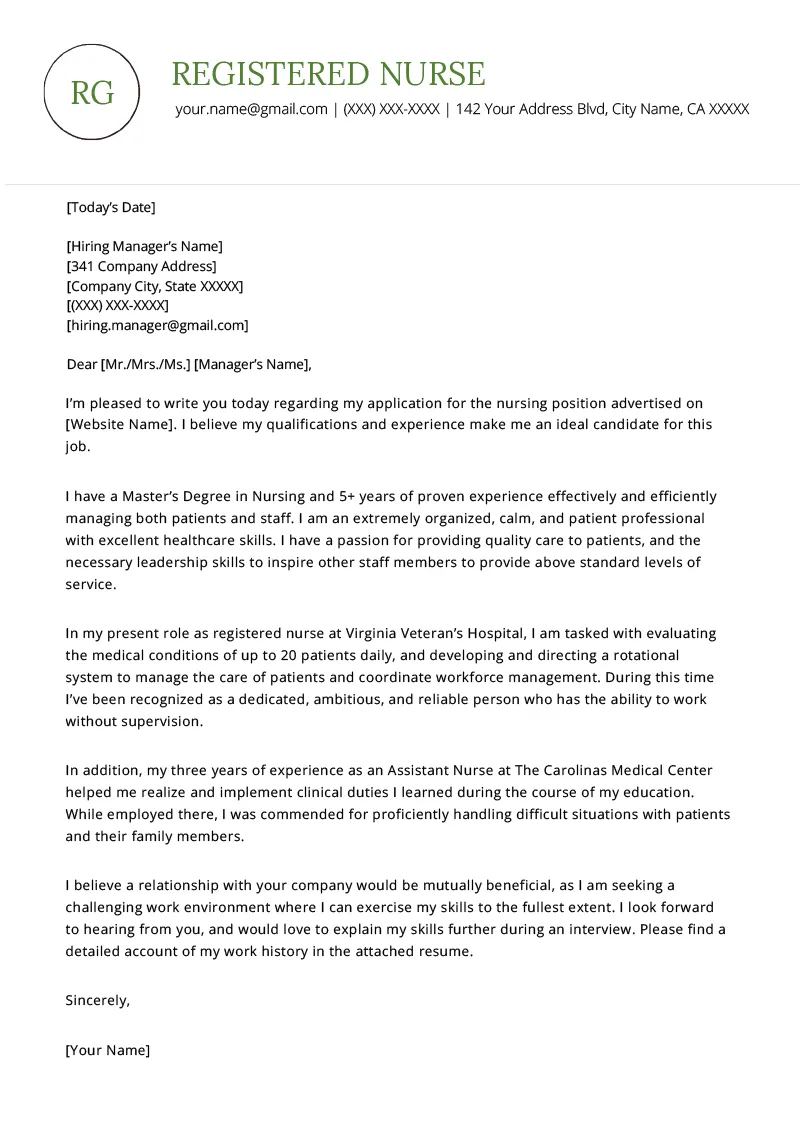
Tailor your cover letter to the specific requirements of your nursing specialty. Different specialties require different skill sets and experiences. Highlighting the most relevant aspects of your career can improve your chances of getting an interview. Whether you are a new graduate or an experienced nurse, make sure you showcase the relevant expertise and passion to contribute to that specialty and its mission. This will help you stand out from other applicants and increase your chances of success. Focusing on your most relevant experiences will highlight you for the specific roles.
New Graduate Nurses
For new graduate nurses, highlight your clinical experiences during your nursing education. Emphasize any clinical rotations in relevant specialties. Include details of any volunteer work, internships, or shadowing experiences that showcase your commitment to nursing. Mention any academic achievements, such as honors or awards. Show your eagerness to learn and your enthusiasm for the profession. Focus on your strong foundation of knowledge and skills, as well as your ability to learn quickly and adapt to new situations. Demonstrate your commitment to providing excellent patient care, even though you may have less professional experience. Emphasize your passion for nursing to stand out.
Experienced Nurses
Experienced nurses should focus on their past accomplishments and quantify their results whenever possible. Highlight specific achievements, such as improvements in patient outcomes, reduced hospital readmission rates, or successful implementation of new protocols. Provide details of any leadership experience, such as charge nurse responsibilities or mentoring new nurses. Tailor your skills to match the job description, and show how your past experiences have prepared you for the new role. Explain your experience in detail by using the STAR method to describe situations and results. This demonstrates the value you bring as a skilled and experienced professional.
